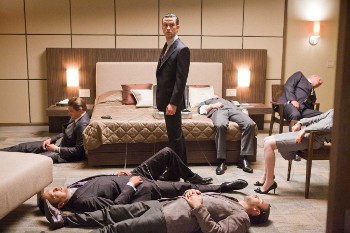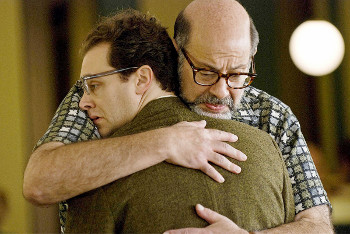Attaboy, Jim
 In my hastily keyboarded notes after seeing Inception last weekend, I spent much time faulting Jim Emerson for his dismissal of Christopher Nolan and of the movie. Emerson made sweeping, unsupported generalizations in the service of his obvious dislike of Nolan’s movies. His pieces (and his responses in the comments sections) represented an attack rather than an argument. It’s only fair, then, to praise Emerson for his essay yesterday, which restates his problems with the film but does so much more cogently and generously.
In my hastily keyboarded notes after seeing Inception last weekend, I spent much time faulting Jim Emerson for his dismissal of Christopher Nolan and of the movie. Emerson made sweeping, unsupported generalizations in the service of his obvious dislike of Nolan’s movies. His pieces (and his responses in the comments sections) represented an attack rather than an argument. It’s only fair, then, to praise Emerson for his essay yesterday, which restates his problems with the film but does so much more cogently and generously.

 In taking down Christopher Nolan’s Inception, Jim Emerson
In taking down Christopher Nolan’s Inception, Jim Emerson  I was surprised after watching (and then reading reviews of) the Coen brothers’ A Serious Man that there was such a fervent (if small) backlash against it. The movie – about a Job-like Jewish professor in a Minnesota suburb in the late 1960s – struck me as so right that I didn’t allow for opposite reactions. Yet there they are.
I was surprised after watching (and then reading reviews of) the Coen brothers’ A Serious Man that there was such a fervent (if small) backlash against it. The movie – about a Job-like Jewish professor in a Minnesota suburb in the late 1960s – struck me as so right that I didn’t allow for opposite reactions. Yet there they are. When I say that the filmed version of Watchmen and the horror remake Quarantine are faithful to the point of tedium, I intend that largely as a compliment. Great talent, care, time, and money have been spent not fixing what ain’t broke. Considered separate from their sources, both movies work. But they’re damned depressing.
When I say that the filmed version of Watchmen and the horror remake Quarantine are faithful to the point of tedium, I intend that largely as a compliment. Great talent, care, time, and money have been spent not fixing what ain’t broke. Considered separate from their sources, both movies work. But they’re damned depressing. Describing
Describing 